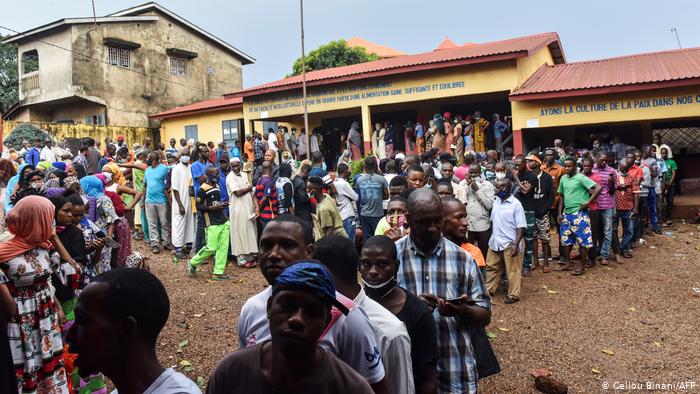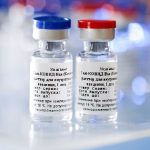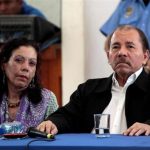Many political analysts expect Alpha Conde to head the presidential election. President Conde who is seeking a controversial third term allowed him by the March constitutional changes, would likely steal the election with “cunning and violence”.
According to preliminary estimates on the ground, and apparently corroborated by the NGO Stand for Life and Liberty (S2L), former Guinean Prime Minister Cellou Dalein Diallo, the head of the Union of Democratic Forces of Guinea (Union des Forces Démocratiques du Guinée, commonly abbreviated UFDG) heads so significantly that he may be elected without the second round.
In Maritime Guinea, one of the country’s four natural regions with Susu (Soussou)-dominated population, Susu politician Kabèlè Abdoul Camara, the head of the Guinean Rally for Development (Rassemblement guinéen pour le développement) party, is leading with 35% of the votes, leaving behind Alpha Condé (31%). The result is a major disappointment for Alpha Condé grown up in Maritime Guinea and won 50.21% of the region’s votes in the 2015 presidential elections.
Condé is also set to lose vote share in Upper Guinea where the majority of the population shares his Malinké ethnicity. The incumbent president is projected to come in second with roughly 35% of the votes, leaving behind economist and former ally Ousmane Kaba, the current head of the Party of Democrats for Hope (Parti des democrats pour l’Espoir). Kaba with his campaign focused on national unity and rebuilding crumbling infrastructure is expected to win 37% of votes in Upper Guinea.
Meanwhile, Cellou Dalein Diallo reportedly heads in the Forested Guinea region (43%), a lead that in combination with his reported more than 90% of the votes in Middle Guinea may prove to be significant enough to earn a first-round victory in the presidential election, even if the second round scheduled for November,24 seems the most probable scenario taken into account the reality. In that case, the coming weeks until the next vote will likely be highly charged with anticipation.
Presidential elections result can trigger ethnic lashes because of the strong ethic-based political division.
President Conde appears to get most of his support from the Mandingo ethnic group; his main opponent, Mr Diallo, draws most of his support from the Fulani ethnic group.
It’s likely that in case of postelectoral situation escalation in Guinea the conflict can move beyond Guinea’s borders. In recent times, Cellou Diallo has been visiting the Fulani Community in neighboring Sierra Leone to garner support for his political ambition in Guinea. Guinean residents in Sierra Leone usually exercise their electoral franchise to vote during elections in Guinea. It is clear why Guinea politicians often shuttle across the border to campaign in Sierra Leone.
Following Diallo’s last visit, Guinea’s President Alpha Conde has accused Sierra Leone’s Vice President Mohamed Juldeh Jalloh of supporting his main opponent.
Dr Jalloh works with Fullah voters whom he has mobilized in readiness to vote for Diallo as the next president of Guinea, so that come 2023 similar efforts can be reciprocated to solicit Guinean Fullah votes for the ruling Sierra Leone People’s Party to secure a smooth second term victory.
Both the VP Jalloh and Mr Cellou Diallo are from the same ethnic Fullah tribe or Puel. In September 2000 southern Guinea was subject to fierce cross-border attacks linked to the Rally of Democratic Forces of Guinea (RFDG), a newly rebel group reportedly backed by Sierra Leone’s Revolutionary United Front (RUF) and Liberia. Around 1,000 people, including many Guinean civilians and refugees from Sierra Leone and Liberia, were killed in the fighting.
RDFG representing mostly soldiers who fled the country after 1985 and the 1996 attempted coups, the RDFG is fighting to end President Lansana Conte’s rule. Lansana Conte rose to power in 1984 following a successful military coup and has run Guinea as a civilian president after the 1993 elections. In 1998 Conte won a second five-year term in presidential elections marred by violence and public unrest. Conte’s ethnic minority, the Soussou, is over-represented in government and opposition figures are dealt with heavy-handedly by the justice system. Coinciding with the rebel incursions in 2000, a Guinean court sentenced Alpha Conde, the leader of the Rally of the Guinean People (RPG), to five years in prison on charges of endangering state security and recruiting foreign mercenaries.
Mr. Conde named Sierra Leone’s Vice President, Dr Mohamed Juldeh Jalloh, of facilitating the training that to his words was ongoing in the Sierra Leonean district of Kambia, home to the main border region connecting the two countries.
On October 17, President Conde ordered his security forces to forcefully occupy Yenga, a border town on the territory of Sierra Leone. Reports say Guinean surveyors and engineers were seen taking measurements in Yenga, a disputable area for the two countries in the past.
The same date Guinea closed its land borders with Guinea-Bissau and Senegal.
Such steps were prompted by fears that Conde’s opponent Cellou Dalein Diallo is training mercenaries in Sierra Leone to provoke unrest in Guinea. We don’t know if these fears are based on intelligence on rebel recruitment in Sierra Leone to invade Guinea or just precautions. Such Conde’s tactic is expected only due to the alleged interferences of vice president Dr Jalloh.
The State Department this month warned against violence and intimidation. It said the U.S. would watch for interference in the democratic process and would “not hesitate to consider consequences — including visa restrictions — for those responsible for election-related violence.”
Other 10 candidates who participated in the presidential run could support Diallo in case of challenge the results of Presidential elections, using cases of poor voting organization. For example, one of the candidates, former Foreign Minister Makale Camara, said she herself had not received a voter card and had been unable to vote. She called it totally unacceptable because there were people who ended up with three or four cards, she told Reuters. She also claimed that there were ‘fictitious’ citizens, who voted.




